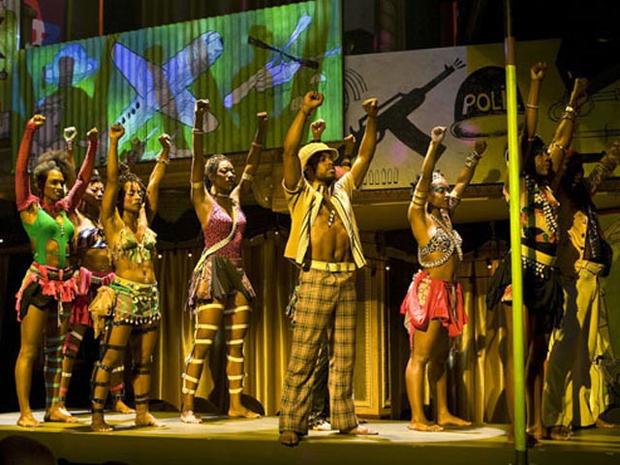Curiocity: Fela! Cast Member On The Man, The Legacy
It's hard to sum up the many accomplishments and full history of Fela Kuti in one short article – let alone a two-hour musical. But the touring production, headed to St. Paul this week, has found the perfect approach to showcase this man's lasting legacy.
As far as Civil Rights champions go, Fela Kuti isn't exactly a household name. But thanks to three Tony Awards and some serious celebrity endorsements, both the man and the critically acclaimed musical are making strides.
Before the show stops at the Ordway Center for Performing Arts this week, we were dying to know more about this fascinating musical and what Fela! is truly all about. The lovely and uber-talented Paulette Ivory (known for creating the role of Nala in London's The Lion King) was kind enough to chat with us about the show and about Fela himself.
Q: Tell us a little bit about Fela!
A: FELA! is basically the story of Fela Kuti – who was a Nigerian activist, humanitarian as well as a musical genius. During the 70s, he would rally for equality for the Nigerian people, and would fight against the military regime of the government and would try to expose the corruption that was happening in the government at the time. And he did that through his music. He coined this phrase called, Afro Beat, which is a mixture of James Brown, funk, gospel, African music, which is very heavy on the baseline with these amazing horn ribbon sections. And it became very, very popular but through the music, he was preaching about politics and bringing about change in Nigeria. But he was beaten down a lot for trying to speak out about what was happening in Nigeria. And still, he never gave up. His story's pretty inspiring.
Q: How were you introduced to the show? What were your first experiences?
A: A friend of mine had seen the show in New York and said to me, there's this role in a show that has your name on it. You have to go up for it. … So I auditioned for the New York company and got the role – and that was my introduction. I kind of was familiar with a couple of the songs and a couple of them were familiar for some reason, I didn't really know why. But once I started hearing his story and the lyrics – when you hear Fela's music, it's like party music, you just want to get up and dance. But when I heard the lyrics, I was like, wow, this man is really preaching about the struggles they were facing in Nigeria. He would call out specific people in the government for things they were doing at the time and you'd know what he was going through. So that made it even more exciting, because you knew how fearless he was.
And I play a character, Sandra Izsadore, who was a member of the Black Panthers as well as a Civil Rights activist in the late 70s. And she met Fela when he was touring in Los Angeles. She was instrumental in changing his political views as well as his musical direction because she introduced him to American Black History with people such as Malcolm X, Martin Luther King, Angela Davis – who he didn't know about. So he was really inspired by how aggressively they fought for Civil Rights.
Q: Was it a challenge at all to play someone who's not just a character but a real person, who had such an influential role?
A: Yeah, absolutely. Because Sandra, she's around, alive and well, and kicking. She lives in L.A. where I live. She's come to a lot of performances – she might even come to St. Paul. And she'll come up on stage and take a bow at the end of the show. So for me, I have to be really true to the character and play her exactly how she would've been at that time – so it's great that I can get her approval. She'll come up to me after the show and be like, 'I'm so proud of you and it just takes me back to that time when I met Fela.' And as long as she's happy, I'm happy. The pressure is different from doing a fictional character – or someone who's not around. I just try to honor who she is and represent her in the best possible light.
Q: It's a rather large cast. How would you describe this group?
A: Fela created this compound, this shrine and it was a big family unit. That's what he wanted – for everyone to be equal and for everyone to have a role and an important place in his compound. And I think for us, we definitely have that family vibe. We have these beautiful, stunning women who play the queens and they're on stage the entire time dancing – for the entire two and a half hours. And same with the guys. It's just a phenomenal cast. Everyone has their featured moments and a lot is required from everybody. And we have Sahr Ngaujah, who plays Fela, and he just completely embodies him. I never know where Sahr ends and Fela begins – it's like they've become one person. And he's become this great leader and a really great head of this company. I think the way Bill (T. Jones, Tony Award winning choreographer) has put this show together, you really feel the camaraderie and family unit that Fela did have in Nigeria when Fela put these people together.
Q: Among the Tony Awards, it won for Best Choreography. How would you describe the dancing and how are you able to go in night-after-night and do such an energetic production?
A: Bill has said himself that what he put together would normally be, a one-time spectacular event done once a year – come and see it, 'cause you'll never see it again. And then these dancers do eight shows a week. It's pretty brutal on the body but we have a touring physical therapist that helps everybody in shape, we all have to eat very well and get loads of rest, a lot of mental preparation. And then your body just gets to learn what it can do and what it can't, where you need to pull back and where you can give 150 percent. … You're definitely seeing something that would not normally be done eight times a week on a Broadway stage. But that's what makes it more special and more interesting.
Q: The show had some pretty big names behind its production with Will Smith and Jada Pinkett Smith, plus Jay-Z, all coming together to make sure the musical came to fruition. What do you think that says about the story?
A: Well it got my attention, too. It was like, 'Wow, Will Smith, Jada? Jay-Z?' And I heard that when they learned about Fela's journey and especially the beatings that he had to endure. He had like 200 beatings or something like that and was constantly thrown in and out of jail. So when they finally released him, it would be like, 'OK, where do we go now?' They picked up right where they left off from. Will and Jada, they were so inspired by that. They felt like people needed to know his story – we know Nelson Mandela, we know a lot of the other great leaders, why do we not know who Fela is? I didn't know who Fela was. Only very little. So they wanted his part, in history and musical history, to be told, to get out there. Get the people's attention. And the show is universal – it does appeal to everyone. It's not just for one group of people. When we look out into the audience, we don't just see one set of people. … People from all around the world are coming to see what Fela went through, who he was and to be entertained. It's very funny at times and very moving at others. We'll have audience participation. We have the audience dance and make them feel like they're in the shrine, not just watching a show. You come away with a complete experience, rather than just observing from afar that might not have any connection to you.
Fela! runs from June 12-17 at the Ordway. For tickets or more information, visit the Ordway's website.




